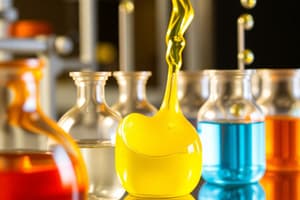Podcast
Questions and Answers
What type of polymers are commonly used for electrical insulation?
What type of polymers are commonly used for electrical insulation?
- Cyanoacrylate monomer
- Polyester and nylon
- Polyethylene and polytetrafluoroethylene (PTFE) (correct)
- Polyethylene and polypropylene
Which process involves the reaction of two different components with the removal of a small molecule as a byproduct?
Which process involves the reaction of two different components with the removal of a small molecule as a byproduct?
- Condensation Polymerization (correct)
- Instant Adhesives
- Addition Polymerization
- Thermoplastics
What is a common monomer used in addition polymerization to produce polyethylene?
What is a common monomer used in addition polymerization to produce polyethylene?
- Ethylene (correct)
- Polytetrafluoroethylene (PTFE)
- Polypropylene
- Cyanoacrylate monomer
Which type of polymers are considered inorganic?
Which type of polymers are considered inorganic?
In which industry are thermoplastics commonly used for applications like insulation and roofing?
In which industry are thermoplastics commonly used for applications like insulation and roofing?
What is a common application of polymers like cyanoacrylate monomer?
What is a common application of polymers like cyanoacrylate monomer?
What is the main difference between plastics and rubbers?
What is the main difference between plastics and rubbers?
Which type of polymers are essential for life processes and provide basic structural materials?
Which type of polymers are essential for life processes and provide basic structural materials?
What is the main difference between thermoplastics and thermosets?
What is the main difference between thermoplastics and thermosets?
Where can natural polymers be found?
Where can natural polymers be found?
Which type of polymers are diamonds and graphite classified as?
Which type of polymers are diamonds and graphite classified as?
What is the role of synthetic polymers in various products?
What is the role of synthetic polymers in various products?
Flashcards are hidden until you start studying
Study Notes
Polymers: Composition, Properties, and Applications
Polymers are large molecules made up of repeating units called monomers. These materials play a crucial role in various applications, including structural and non-structural materials, mass-manufactured goods, and one-off specialty products. The growth in the use of polymers has continued over the past few decades, with the demand for traditional materials like metals, ceramics, and glasses remaining stable or decreasing.
Natural Polymers
Natural polymers are found in living organisms and make up many of the materials in plants and animals. Organic polymers, such as proteins, cellulose, and nucleic acids, are essential for life processes and provide basic structural materials. Inorganic polymers, like diamond and graphite, are also found in nature.
Synthetic Polymers
Synthetic polymers are produced industrially and are used in a wide range of products. They can be classified into two main types: plastics and rubbers. Plastics are generally rigid materials at service temperatures, while rubbers are flexible and exhibit long-range elasticity. Plastics can be further divided into thermoplastics, which are thermally reversible and can be melted and reshaped, and thermosets, which have crosslinked structures.
Properties and Applications
Polymers have a wide range of properties that make them suitable for various applications. They can be tailored to have specific properties, such as high strength, flexibility, or resistance to heat or chemicals. Some common applications of polymers include:
- Packaging: Polymers like polyethylene and polypropylene are used to make plastic bags, food wrap, and other packaging materials.
- Building: Thermoplastics are used in construction for insulation, roofing, and other applications.
- Fibers: Polymers like polyester and nylon are used to make textiles and fibers for clothing.
- Adhesives: Polymers like cyanoacrylate monomer are used to create instant adhesives.
- Electrical Insulation: Polymers like polyethylene and polytetrafluoroethylene (PTFE) are used for electrical insulation.
Polymerization Processes
There are two main types of polymerization reactions: addition polymerization and condensation polymerization.
- Addition Polymerization: In this process, monomers add to each other, forming long chains of identical monomer units. Ethylene is a common monomer used in addition polymerization to produce polyethylene (polythene).
- Condensation Polymerization: This process involves the reaction of two different components, often with the removal of a small molecule, such as water, as a byproduct. Condensation polymers, such as polyester (Dacron) and polyamide (Nylon 66), are formed through this type of polymerization.
Polymer Structure and Properties
The structure of polymers can be controlled through fine-tuned catalysis of polymerization, leading to the development of new polymers with specific properties. Some polymers are based on carbon-carbon, carbon-oxygen, or carbon-nitrogen bonds, while others, like silicones, are considered inorganic polymers.
Conclusion
Polymers are essential materials with a wide range of applications due to their versatile properties. They have transformed many industries, including construction, packaging, and electronics, and will continue to play a crucial role in the future.
Studying That Suits You
Use AI to generate personalized quizzes and flashcards to suit your learning preferences.




